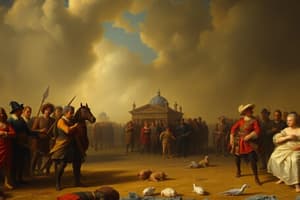Podcast
Questions and Answers
What significant publication by Diderot was released in 1751, and what was its impact on knowledge dissemination?
What significant publication by Diderot was released in 1751, and what was its impact on knowledge dissemination?
Diderot's Encyclopedia was published in 1751, and it significantly impacted knowledge dissemination by compiling and spreading Enlightenment ideas across Europe.
Which king was crowned in Prussia in 1740, and what notable reforms is he known for?
Which king was crowned in Prussia in 1740, and what notable reforms is he known for?
Frederick the Great was crowned King of Prussia in 1740, known for his military successes and significant administrative reforms.
Identify the year the British Colonies declared independence from England and its historical significance.
Identify the year the British Colonies declared independence from England and its historical significance.
The British Colonies declared independence from England in 1776, marking the beginning of the United States as a sovereign nation.
What major political event began in 1789 in France, and what were the key ideals that drove it?
What major political event began in 1789 in France, and what were the key ideals that drove it?
Which economic work by Adam Smith was published in 1776, and what key concept did it introduce?
Which economic work by Adam Smith was published in 1776, and what key concept did it introduce?
Diderot’s ______ is published in 1751.
Diderot’s ______ is published in 1751.
In 1740, ______ the Great is crowned King of Prussia.
In 1740, ______ the Great is crowned King of Prussia.
The ______ Revolution begins in 1789.
The ______ Revolution begins in 1789.
Rousseau published ______ in 1762.
Rousseau published ______ in 1762.
Catherine the Great took power in ______ after her husband's death in 1762.
Catherine the Great took power in ______ after her husband's death in 1762.
Flashcards are hidden until you start studying
Study Notes
Key Historical Events and Figures
-
Diderot’s Encyclopedia was published in 1751, marking a significant contribution to the Enlightenment by compiling knowledge across various disciplines and promoting rational thought.
-
Frederick the Great was crowned King of Prussia in 1740. His reign is noted for military victories, territorial expansion, and leading Prussia toward becoming a major European power.
-
The British Colonies declared independence from England in 1776, resulting in the formation of the United States and a shift in the balance of power.
-
The French Revolution began in 1789, fundamentally altering France's political landscape and inspiring revolutionary ideas worldwide, focusing on liberty, equality, and fraternity.
-
Jean-Jacques Rousseau published The Social Contract in 1762, introducing concepts about the political and social agreement between individuals and the state, influencing democratic ideas.
-
Catherine the Great ascended to power in Russia in 1762 following her husband’s death, becoming one of Russia's most influential leaders, known for westernizing the nation and expanding its territory.
-
Adam Smith's influential economic work, The Wealth of Nations, was published in 1776, advocating for free market principles and laying the groundwork for modern economics.
-
Montesquieu published The Spirit of Laws in 1748. This work examined various government forms and promoted the idea of separation of powers, which has become foundational in modern democracies.
Key Historical Events and Figures
-
Diderot’s Encyclopedia was published in 1751, marking a significant contribution to the Enlightenment by compiling knowledge across various disciplines and promoting rational thought.
-
Frederick the Great was crowned King of Prussia in 1740. His reign is noted for military victories, territorial expansion, and leading Prussia toward becoming a major European power.
-
The British Colonies declared independence from England in 1776, resulting in the formation of the United States and a shift in the balance of power.
-
The French Revolution began in 1789, fundamentally altering France's political landscape and inspiring revolutionary ideas worldwide, focusing on liberty, equality, and fraternity.
-
Jean-Jacques Rousseau published The Social Contract in 1762, introducing concepts about the political and social agreement between individuals and the state, influencing democratic ideas.
-
Catherine the Great ascended to power in Russia in 1762 following her husband’s death, becoming one of Russia's most influential leaders, known for westernizing the nation and expanding its territory.
-
Adam Smith's influential economic work, The Wealth of Nations, was published in 1776, advocating for free market principles and laying the groundwork for modern economics.
-
Montesquieu published The Spirit of Laws in 1748. This work examined various government forms and promoted the idea of separation of powers, which has become foundational in modern democracies.
Studying That Suits You
Use AI to generate personalized quizzes and flashcards to suit your learning preferences.




